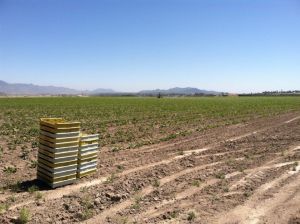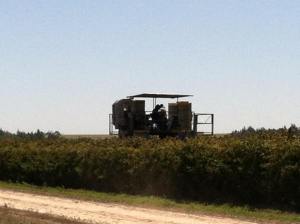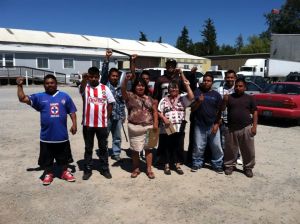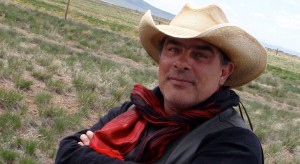Copyright by and reproduced with permission from Devon Peña, Professor of Anthropology,
University of Washington, Seattle WA.
THE SAKUMA WORKERS’ STRIKE
Devon G. Peña | Las Colonias de San Pablo, CO | July 16, 2013

Burlington is not a very old city center and got its start in 1902 as a logging camp. Today the small town of 8,380, located in the Skagit River watershed north of Seattle, does count with a prosperous fruit and vegetable agricultural industry. Of course, the industry relies on mostly migrant families for farm labor. This is especially the case during harvest work and strawberry crops present an opportunity for workers to seize the current condition of ‘labor scarcity’ and high demand for skilled pickers during harvest time to organize for their workplace rights. And that is exactly what has happened in the State of Washington, and not in the Yakima or Wenatchee valleys but on the western side of the Cascades where peri-urban farming is increasingly big business.
The strike that started here in early July focuses on the Sakuma Brothers strawberry operation outside Burlington. Without harvest workers the strawberry fields would go to waste. According to Richard Sakuma, “We can grow the best crop there is, but if we don’t have the people to harvest, we’re pretty well sunk” (Holmes 57).
According to a recent activist blog post at Káráni: Escribrir y Volar, the workers understood this double bind – that they too would be without a means of livelihood if the produce perished in the fields and there was nothing left to harvest:
The Sakuma Worker’s Rights Committee agreed to return to the fields on July 16, 2013 after a six-day work stoppage. The President of Sakuma Brothers Farms, Steven Sakuma, offered to pay the pickers $3.75 per flat instead of .30 cents per pound. The workers were not thrilled, because it was still a low piece rate, but explained that with this rate, “el trabajo es mas calmado,” that the pace of work was not as difficult to keep up, referring to the speed up that .30 cents per pound resulted in with the particular strawberry field in question.
The Sakuma workers’ campaign is an example of a classic worker-capitalist conflict: The piece-rate system that was being imposed on the workers at Sakuma is an age-old practice used by capitalist producers and it is designed to control the productivity of workers. This is done with the “piece-rate” that requires the worker to accelerate the pace of and intensity of harvest labor expended to receive the bare minimum payout. The producer most often uses this strategy of “Taylorism” or scientific management to make workers compete against one another by rewarding the rate-busters or workers that set the upper limit of the productivity curve. This promotes horizontal conflict between workers and allows the capitalist to deflect or suppress “vertical” or bottom-up conflict. The point is to use piece-rates not just to exploit “uncondensed” or “raw” manual labor more efficiently but to divide and conquer the workforce and this is what part of the workers’ struggle at Sakuma appears to be focused on.
The workers’ current proposal to address this system is focused on a “hybrid” model that guarantees at least the minimum wage while implementing a participatory or worker co-managed approach to the setting of future piece-rates. Again, the Káráni report:
As part of this agreement, the [workers’] committee was able to convince Steve Sakuma to change the process under which future piece rates are determined, by allowing three pickers of varying abilities selected by the committee to join the head supervisor on the field test which determines piece rate for a particular field the day before it is to be picked. These three workers are to be paid the state minimum wage for a a full day’s labor and based upon their production a piece rate will be established by their supervisor. The pickers will then have the ability to discuss the piece rate and have the option to opt out of picking a particular field without reprisal if they believe the piece rate is too low. Steve Sakuma agreed to draw up the process in writing and to have the policy posted at the labor camps for future migrant workers who may not have been present during negotiations.
 This strike has the makings of an honorable tradition in which the strike committee refused “an initial offer of a full day’s work for 100 people based upon the partially completed field. Instead, they negotiated for a partial day’s work for all 200 workers they were representing.” The Sakuma family has also shown signs of softening their approach and engaging the workers in pursuit of a more equitable and participatory co-management approach. According to the post in Káráni:
This strike has the makings of an honorable tradition in which the strike committee refused “an initial offer of a full day’s work for 100 people based upon the partially completed field. Instead, they negotiated for a partial day’s work for all 200 workers they were representing.” The Sakuma family has also shown signs of softening their approach and engaging the workers in pursuit of a more equitable and participatory co-management approach. According to the post in Káráni:
In 2004, when family members and elders of some of the current pickers had a work stoppage around very similar concerns, Richard Sakuma had explained that his goals in relation to the farmworkers was to be, “fair and consistent.”(58) Steve Sakuma’s younger brother admitted that without the fair treatment of farmworkers, their farm would not be able to survive. It is clear from the flow of the negotiations that the Sakuma executives understand that their future success is bound with these farmworkers, moreso than vertical integration or mechanization.

I agree with the Káráni post that “the direct negotiations taking place at Sakuma Brothers Farm are unique and historical.” It has been nearly unheard of for farm workers to gain any type of remedies to address concerns of workplace management or workplace democracy in Washington State or elsewhere. This is challenging enough and the lack of a collective bargaining or other binding agreement further complicates the effort.
However, I do agree that: “when farm workers and growers work together, and change the process to include as opposed to exclude collaboration, the possibilities are endless.” Indeed, this could be a first step toward eventual worker ownership and self-management of the operation, especially if future Sakuma generations do not commit to continue to farm. That would be another welcomed example of the trend involving a transition from migrant farm worker to cooperative farmer.
In solidarity with this important workers’ autonomy movement, I gladly present a message from the Sakuma Worker’s Rights Committee, and will be providing updates as this movement unfolds.
A Message from the Farm Workers
We appreciate the respect that the Sakuma executives have given us during these negotiations and we want to take this opportunity to express our gratitude for the support that the solidarity community has given us and ask that you continue to support our continuing struggle for dignity.
STRIKE COMMITTEE LIST OF GRIEVANCES
- Que no corran a Federico Lopez. For Federico Lopez not to be fired. Demand Met/Cumplida. Federico Lopez was unjustly fired on July 10, 2013. This violates labor regulations governing retaliation by employers over worker grievances. Federico Lopez should be made whole, including being reinstated as a picker, with restoration of any pay, and supervisors should cease and desist retaliation as required by law.
. - Que nos suban más por libra, 70 centavos. We want a higher rate per pound, 70 cents. In Negotiation/En Negociación. Sakuma Brothers Farms set a piece rate wage at .30 cents per pound at the beginning of the blueberry harvest, pickers are struggling to make the minimum wage of $9.19 per hour at this rate in an 8 hour period. This violates Washington state minimum wage requirements. Pickers should be made whole, by being paid at least the equivalent of $9.19 an hour for their time picking berries.
. - Quitar el scaner y poner tarjetas. To remove scanners and use paper tickets. In Negotiation/En Negociación. Sakuma Brothers Farms has introduced electronic scanners in place of paper tickets for documentation of pounds picked which calculates their wages. This new system hampers the picker’s ability to keep track of their production and limits their ability to dispute inaccurate entries. This violates workers rights to wage transparency. Pickers should be made whole by returning to paper tickets and the removal of underage youth from checker positions.
. - No más intimidación a los trabajadores. To cease intimidation of workers. Demand not met. Pickers have experienced harassment based upon race and indigenous identity in the workplace. This violates state laws against harassment and a hostile workplace and Title VII of the Civil Rights Act of 1964 and Sakuma Brothers Farm policy against intimidation and violence in the workplace. Pickers should be made whole, including but not limited to, enforcement of company policy and Sakuma Brothers Farm should cease and desist racial and ethnic harassment as required by law.
. - No queremos a Antonio Lopez como mayordomo. We want Antonio Lopez removed as a crew boss. Demand Met/ Cumplida. Pickers have identified crew boss Antonio Lopez as being unbearably hostile. This violates state laws against harassment and a hostile workplace and Title VII of the Civil Rights Act of 1964. Pickers should be made whole, including but not limited to, the dismissal of Antonio Lopez as a supervisor.
. - Mejor trato a los trabajadores, respeto, lugar limpio, cabinas con mejor condiciones, no gritos ni amenazas. Better treatment of workers, respect, clean place to live, better-maintained conditions, no yelling or threats. Demand not yet met. Pickers want to be treated with human dignity in the workplace and labor camps. Substandard living accommodations, unsanitary facilities, and racialized hostilities violate the migrants’ human rights. Pickers should be made whole, including but not limited to, maintenance and betterment of labor camp by Sakuma Brothers Farms and that labor camp managers cease and desist hostility and harassment as required by law.
. - No forzar a trabajar en tiempo de enfermedad. No tocar las puertas. Not to be forced to work when they are sick. Not to knock on doors. Demand not yet met. Pickers have been denied sick leave. This violates workers human rights. Pickers should be made whole, including but not limited to, supervisors cease and desist the practice of knocking on the door of sick workers to force them to work.
. - No obligar a traer comprobantes por falta de trabajo. To not require proof for missing work. Demand not yet met. Pickers have been unjustly required to provide professional documentation for missing work. This violates workers right to privacy. Pickers should be made whole by a discontinuation of the practice of requiring professional documentation for absences.
. - No falta de respeto a los trabajadores. Do not disrespect workers. Demand not yet met. Indigenous pickers are not treated with respect at Sakuma Brothers Farm. This violates their human dignity and violates state anti-harassment and anti-hostility laws. Workers should be made whole, including but not limited to, the cease and desist of disrespectful and racist language such as “oaxaquita,” “indio,” “estupido,” and the use of stereotypes around inherent “laziness,” “drunkeness,” or “dirtiness” of Triqui and Mixteco farmworkers by Sakuma Brothers Farm executives, administrators, crop management, crew bosses, checkers and co-workers via receiving mandatory sensitivity and undoing racism training, and dismissal following failure to comply.
. - No intimidación por la parte de mayordomos. No intimidation by supervisors. Demand not yet met. Pickers have experienced racialized and gendered harassment and hostility by their supervisors, for example yelling and screaming at women in front of their husbands. This violates state laws against harassment and hostile workplaces and Title VII of the Civil Rights Act of 1964, as well as Sakuma Brothers Farm policy against intimidation and violence in the workplace. Workers should be made whole, including but not limited to, supervisors ceasing and desisting harassment based on race and gender as required by law and also receive mandatory effective sensitivity and undoing racism training, and dismissal following failure to comply.
. - Si nos corren que nos pagen todo y pasajes por venir y de regreso. If we are fired we want our travel expenses to be paid roundtrip. Demand not yet met. Pickers are concerned that they will be fired for work stoppages, complaints, grievances and demands for better wages. This violates the workers good faith in negotiating their wages with their employer, their freedom of association, and anti-retaliation labor law. Workers should be made whole should they be fired for striking, by being reimbursed roundtrip cost of transportation required to migrate to work out of state that were incurred in order to work for Sakuma Brothers Farms.
. - Porque no trajeron a trabajadores huespedes a la fresa? Why didn’t Sakuma Brothers Farm request guestworkers for the strawberry harvest? Demand not yet met. Sakuma Brothers Farms has applied for H2A workers for the blueberry harvest in August. Pickers want to know why the farm had not applied for H2A workers for the strawberry harvest if there was a labor shortage. The pickers claim that there is no labor shortage and that it is unfair that guestworkers are getting paid $12.00 per hour, while they are earning a maximum of $9.19 per hour.
. - Que pagen overtime. To be paid overtime. Demand not yet met. Pickers routinely work over 40 hours a week without overtime compensation. This violates state minimum wage and federal labor laws. Workers should be made whole, by being paid overtime and restoration of any pay that is owed.
. - Problemas con la cuidad de infants y niños. Problems with child care. Demand not yet met. Pickers have experienced problems with child care. This interferes with their ability to work as much as they are required. Workers should be made whole, including but not limited to, adequate childcare or reasonable working hours.
Solidarity statements can be forwarded to Community to Community Development by e-mail at decomunidad@qwestoffice.net.
Farm workers had been on work stoppage for six days, going they without wages for that period of time. At this time supporters are asking for contributions of food, sundries, and disposable diapers. Gift cards to purchase food at Costco or local grocers are much appreciated.
Durable goods can be delivered directly to:
Labor Camp 2
1302A Benson Road
Burlington, WA 98338.
We are also requesting support in our transportation costs via gift cards for gas or contributions to the strike fund.
________________________________________
About Devon G. Peña
 A lifelong activist in the environmental justice and resilient agriculture movements, Devon G. Peña is a Professor of American Ethnic Studies, Anthropology, and Environmental Studies at the University of Washington in Seattle. He also works on the family’s historic acequia farm in San Acacio, Colorado.
A lifelong activist in the environmental justice and resilient agriculture movements, Devon G. Peña is a Professor of American Ethnic Studies, Anthropology, and Environmental Studies at the University of Washington in Seattle. He also works on the family’s historic acequia farm in San Acacio, Colorado.
A pioneering interdisciplinary research scholar and widely-cited author, his most recent books include Mexican Americans and the Environment: Tierra y Vida (U. of Arizona Press, 2005) and The Oxford Encyclopedia of Latinos and Latinas in the United States (senior editor, Oxford University Press, 2005).
Dr. Peña is the Founder and President of The Acequia Institute, the nation’s first Latina/o charitable foundation dedicated to supporting research and education for the environmental and food justice movements.
Read this article as it was originally published here.
